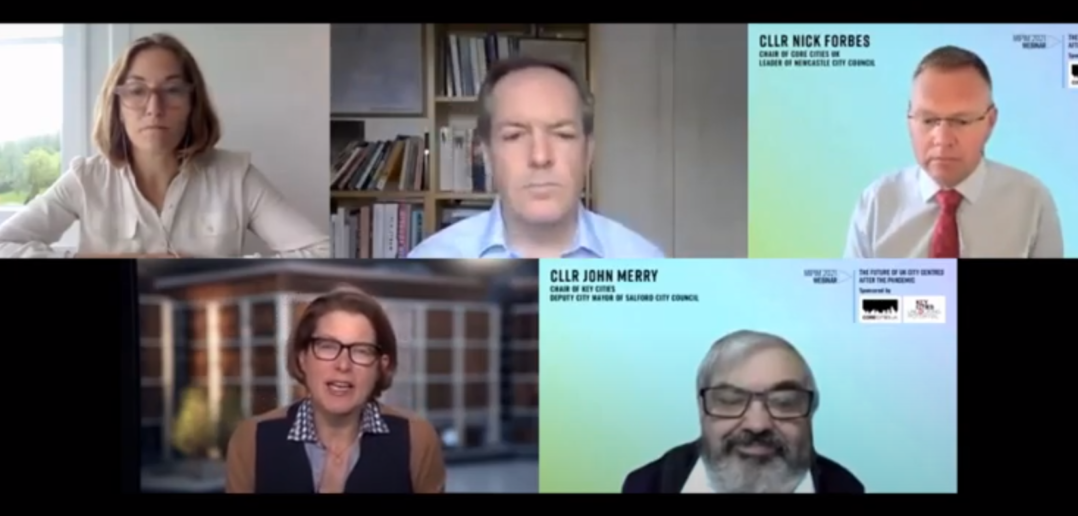As we begin to emerge from a series of lockdowns, hopefully for the last time, how can we go about reviving and renewing our cities and our towns through urban regeneration? How can local government work with citizens, central government and the private sector to deliver necessary improvements, not just in response to Covid, but to the myriad of issues which affect urban areas.
MIPIM World in partnership with Key Cities, Core Cities and MetroDynamics recently hosted a webinar, chaired by Stephanie Flanders, senior executive editor at Bloomberg and head of Bloomberg Economics, to discuss these crucially important questions.
Asked to kick off proceedings with an overview of cities’ post-pandemic future, Ben Lucas, managing director of economic consultants Metro Dynamics, said key and core cities were critically important to the UK economy, accounting for roughly a third of the country’s population and its jobs.
“Such places hold the key to the UK’s recovery. “If they are able to generate levels of output that are similar to the rest of the UK they have the potential to add £89bn of economic value. And with much of the UK’s deprivation levels to be found in these places, by levelling up we can take 3.3 million people out of this situation.”
It’s how across wider economic corridors our cities can help both themselves and towns recover – Ben Lucas
Lucas and his team had developed a framework for assessing how to accelerate the shifts towards a more inclusive urban renewal process, one that would require collaborative working between cities, citizens, anchor institutions, businesses, and investors. “And it’s not just a city-only agenda,” he said. “It’s how across wider economic corridors our cities can help both themselves and towns recover.”
Sadie Morgan, founding director of the Quality of Life Foundation, talked about the need to create “towns and cities that encourage freedom of movement, which means prioritising people over cars, and we need to create distinctive places that inspire a sense of belonging, and togetherness, all of which cities do incredibly well.
“Ultimately, people will live where they feel most happy, most content, most healthy, assuming they have the opportunity of choice,” she added. “If we want to give them choice, if we want people to really feel confident and happy to live in cities in the future, we need to progress their fundamental needs for the quality of their lives.”
On the subject of inclusivity around urban renewal, Nick Forbes, chair of Core Cities UK and leader of Newcastle City Council, said key and core cities needed to learn from the economic realignments seen in the 1980s and ‘90s, “where we moved from an industrial and manufacturing economy to a service economy. That created the sense that some of the towns were left behind and the focus for the future was in city centres.”
“We understand that we need to have a vision for our place, that it needs to be based around people and be around a sense of reimagining public space, as well as thinking about how we’re creating the next generation of jobs. The problem is that current government policy is working against us on that. We need an inclusive renewal deal, not a hotchpotch of different funding streams.”
John Merry, chair of the Key Cities organisation and deputy city mayor of Salford City Council, suggested local government had performed well during the pandemic. “It was local government that rolled up its sleeves and delivered, where I don’t think central government necessarily had the best strategic vision to do that. I think because of that, we ought to be supported in terms of a desire to reshape our places.”
While discussing strategies for urban renewal, the panel debated the future of the workplace, with the rise of shared or co-working spaces. This prompted Ben Lucas to suggest working practices will become more flexible. “You will see some of these shared workspaces in neighbourhoods, in suburbs and towns, as well as in the city centres. Wherever we’re working many will still want some level of social interaction. But it doesn’t follow that we all have to be in what are basically giant white-collar factories, which is what a lot of offices were.”
Such flexible spaces will start springing up not just in cities but in many places, said Sadie Morgan, “because it’s about getting out of your home and to a place nearby that offers the services you need, but most importantly offers you a sense of connection with others.
There’s a big opportunity for co-collaborative spaces, ones that aren’t just about startups, but are about well-established practices or businesses that just want to downsize, but don’t want to do so in isolation -Sadie Morgan
This ‘work local’ approach would meanwhile fit with the 15-minute neighbourhood, said Nick Forbes, since one of the things that Covid had highlighted was how much people valued having facilities within easy walking distance of their home. “It’s only a matter of time before we see the office equivalent of car clubs, places that allow people to share accommodation, rather than each employer having their own space that they manage.”
Planning remained a key element in urban renewal, albeit that the government’s planning proposals are controversial for some. Nick Forbes said if implemented, the plans would remove much from the remit of local government.
The idea that less regulation was the answer was a complete fallacy, he argued. “We need to be able to shape our places for the better. And that means not only stronger planning powers to make sure that we can ensure we’ve got the right developments in the right place, but stronger regulatory powers to make sure that things are done properly and effectively.”
Finally, if presented with the ability to wrest from central government one thing that would improve the lot of towns and cities, what would it be?
Top of John Merry’s wishlist would be the local authority’s ability to raise finances, “the possibility of borrowing against council assets, so that we’ve got a key source of finance that’s free of government control,” he added.
Nick Forbes said he wanted control over the skills and training budgets, “because putting alongside the work we’re doing to bring in the [necessary]investment it’s the thing that we know. And it will help us against the tidal wave of unemployment that could otherwise come our way.”
And Sadie Morgan said that anything done in the name of devolution had to give people the security to plan for the long term. “We have to think about the future differently. It’s about looking at the long term in a way that isn’t fixed, that understands that the pressures and the difficulties that we’re going to face will mean we have to be light on our feet and adaptable along the way.”



